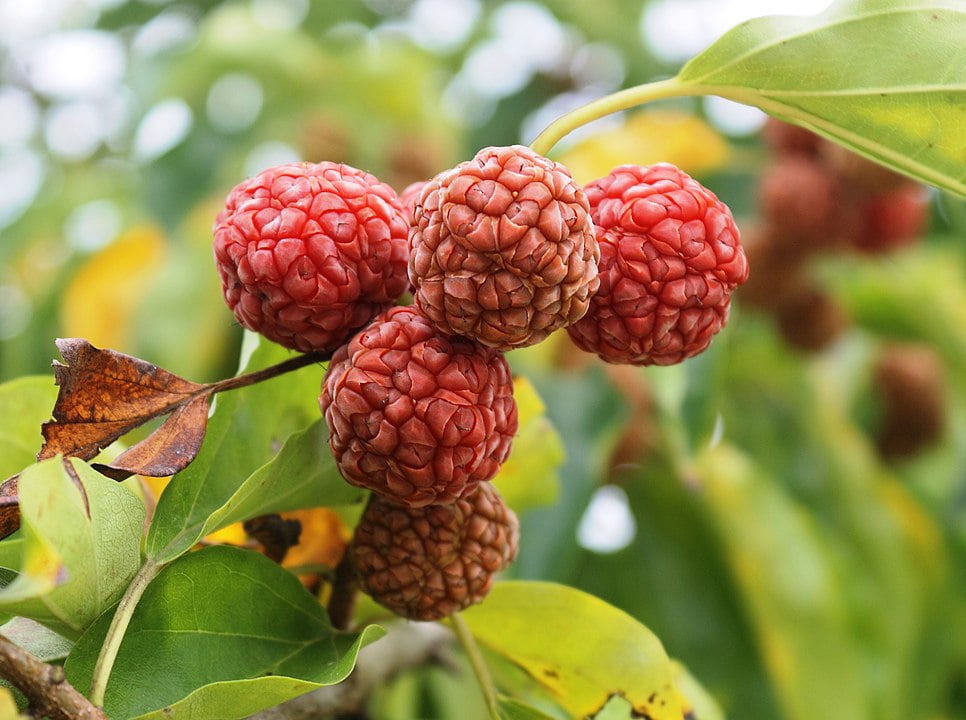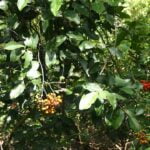
The Chinese mulberry, also known as the “zhe” in Chinese, is a species of mulberry tree that is native to China and is known for its delicious and sweet fruit. The tree is a deciduous species and can grow up to 20 meters in height and is typically found in forests or along riverbanks. (You can find more interesting fruits that start with Z like the Zig Zag Vine Fruit at Fruits or Vegetables that Start with Z)
The leaves of the Chinese mulberry tree are large and green, and the fruit is typically red or black in color when ripe. The fruit is typically harvested in late summer and early fall, and it is often eaten fresh or used to make jams and jellies. The Chinese mulberry fruit is also an important ingredient in traditional Chinese medicine and is believed to have a number of health benefits.

Zhe Fruit Benefits
The Chinese mulberry fruit (zhe) is rich in vitamins and minerals, including vitamin C, vitamin K, and potassium. It also contains antioxidants that help to protect cells from damage and lower the risk of chronic diseases such as heart disease and cancer. The fruit is also a good source of dietary fiber, which can help to improve digestion and prevent constipation.
The Chinese mulberry fruit is also believed to have anti-inflammatory properties, which can help to reduce pain and swelling in the body. This makes it a useful treatment for conditions such as arthritis and gout. The fruit is also believed to have blood sugar-lowering properties, which can be helpful for people with diabetes.
The Chinese mulberry fruit is also an important ingredient in traditional Chinese medicine. The fruit is believed to have a tonifying effect on the body, which means that it can help to strengthen the immune system and improve overall health. It is also believed to have a calming effect on the mind and to be useful for treating anxiety and stress.
Other Uses
The Chinese mulberry is also an important tree in the silk industry. The leaves of the tree are the primary food source for silkworms, which are used to make silk. The tree is commonly cultivated for the silk industry and is typically grown in large orchards.
In addition to its culinary and medicinal uses, the Chinese mulberry is also a popular ornamental tree. It is often planted in gardens and parks for its attractive appearance and shade-providing capabilities.
The Chinese mulberry is a hardy tree that can tolerate a wide range of growing conditions. It can be grown in full sun or partial shade and prefers well-drained soil. The tree is also drought tolerant, making it well-suited for dry climates.
Overall, the Chinese mulberry is a versatile and valuable tree with a wide range of uses. Its delicious fruit, medicinal properties, and role in the silk industry make it an important part of Chinese culture and economy. Its hardiness and ornamental value also make it a valuable addition to any garden or landscape.
Final Thoughts
Chinese Mulberry is a delicious and nutritious fruit that is native to China. It is rich in vitamins, minerals, and antioxidants, which can provide a wide range of health benefits. It is also used in traditional Chinese medicine and is known for its anti-inflammatory and blood sugar-lowering properties. Furthermore, it’s an important tree in the silk industry and it is a popular ornamental tree. Its hardiness and drought tolerance make it a valuable addition to any garden or landscape.
Lance has been passionate about the plant-based diet and we have been following a whole food plant-based diet for over 5 years. We focus on health, natural healing, weight management, animal rights, and the health of the planet and environment by focusing on whole plant-based foods and sustainable practices.
Learn more at the About Me page and follow on social media at the links below.






